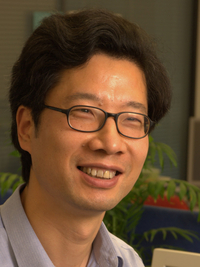
Name: Dr. Xin Yao (IEEE Fellow), Professor of The University of Birmingham, UK
Title of talk: Ensemble Approaches in Learning
Abstract:
Designing a monolithic system for a large and complex learning task is hard. Divide-and-conquer is a common strategy in tackling such large and complex problems. Ensembles can be regarded an automatic approach towards automatic divide-and-conquer. Many ensemble methods, including boosting, bagging, negative correlation, etc., have been used in machine learning and data mining for many years. This talk will describe three areas of ensemble methods in multi-objective learning, online learning with concept drift, and multi-class imbalance learning. Given the important role of diversity in ensemble methods, some discussions and analysis will be given to gain a better understanding of how and when diversity may help ensemble learning.
Some materials use in the talk were based on the following papers:
A Chandra and X. Yao, ``Ensemble learning using multi-objective evolutionary algorithms,'' Journal of Mathematical Modelling and Algorithms, 5(4):417-445, December 2006.
L. L. Minku and X. Yao, "DDD: A New Ensemble Approach For Dealing With Concept Drift,'' IEEE Transactions on Knowledge and Data Engineering, 24(4):619-633, April 2012.
S. Wang and X. Yao, ``Multi-Class Imbalance Problems: Analysis and Potential Solutions,'' IEEE Transactions on Systems, Man and Cybernetics, Part B, 42(4):1119-1130, August 2012
Short biography
Xin Yao is a Chair (Professor) of Computer Science and the Director of CERCIA
(Centre of Excellence for Research in Computational Intelligence and
Applications) at the University of Birmingham, UK. He is an IEEE Fellow and a
Distinguished Lecturer of IEEE Computational Intelligence Society (CIS). His
work won the 2001 IEEE Donald G. Fink Prize Paper Award, 2010 IEEE Transactions
on Evolutionary Computation Outstanding Paper Award, 2010 BT Gordon Radley
Award for Best Author of Innovation (Finalist), 2011 IEEE Transactions on
Neural Networks Outstanding Paper Award, and many other best paper awards at
conferences. He won the prestigious Royal Society Wolfson Research Merit Award
in 2012 and was selected to receive the 2013 IEEE CIS Evolutionary Computation
Pioneer Award. He was the Editor-in-Chief (2003-08) of IEEE Transactions
on Evolutionary Computation and is an Associate Editor or Editorial
Member of more than ten other journals. He has been invited to give 65
keynote/plenary speeches at international conferences. His major research
interests include evolutionary computation and ensemble learning.